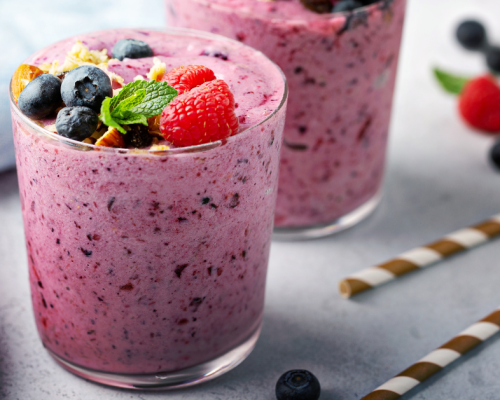Kombucha, a fermented tea drink, is well-loved for its distinct flavor and potential health benefits. Many people think it’s good for weight loss, particularly for shrinking belly fat. In this article, we will take a closer look at these claims.
We will investigate whether kombucha really aids in weight loss, how much of it you should drink, and the best time to consume it. As kombucha grows in popularity, separating fact from fiction is crucial. Our aim is to provide you with straightforward, accurate information to help you decide if kombucha fits into your diet. Let’s find out the truth about kombucha and weight loss.
Read also: Easy Bahama Mama Smoothie Recipe
Table of Contents
ToggleCan Kombucha Reduce Belly Fat?
Kombucha has been buzzing as a drink that might help with belly fat reduction. Let’s see what science has to say about it. Made from tea, sugar, bacteria, and yeast, kombucha goes through a fermentation process. This produces a beverage rich in probiotics, which are beneficial bacteria for your gut health.
Having a healthy gut is linked to several benefits, including weight control. The probiotics in kombucha can help maintain a healthy balance of gut bacteria, crucial for good digestion and possibly aiding in weight management. However, it’s important to understand that drinking kombucha alone isn’t enough to lose belly fat.
For effective weight loss, maintaining a balanced diet and regular exercise is essential. While kombucha isn’t a miracle cure, it can complement a healthy lifestyle, supporting your overall health and weight loss efforts.
How Much Kombucha Should I Drink a Day for Weight Loss?
When considering kombucha for weight loss, remember that moderation is crucial. Kombucha can be a healthy choice for your diet, but it’s not a magic solution. So, what’s the right amount to drink?
Health experts recommend enjoying one to two cups (8-16 ounces) of kombucha a day. This quantity provides benefits without going overboard. Since kombucha contains acids and probiotics, drinking too much can upset your stomach. It also has some caffeine and sugar, so keeping an eye on your intake is wise.
Keep in mind, kombucha should complement a balanced diet. It’s most effective alongside healthy eating habits and regular exercise. Drinking kombucha by itself won’t lead to major weight loss, but it can support your overall health and weight loss journey.
7 Ways Kombucha Can Aid in Your Weight Loss Journey
Drinking kombucha at the right time can enhance its potential benefits for weight loss. Here are some detailed insights on when and how to incorporate kombucha into your routine:
1.Improving Gut Health
A healthy gut is more efficient at digesting food and absorbing nutrients, which is essential for weight management. When your stomach is happy, it processes food better, potentially reducing the calories absorbed from what you eat. This means that even if you indulge in that extra pizza or that delicious local pastry, kombucha can help your body handle it better.
A well-balanced gut flora, similar to the probiotics in kombucha, also means less bloating and discomfort. So, you can enjoy it without the pesky tummy troubles that often come with trying new foods.
2.Reducing Sugar Cravings:
Kombucha has a unique, slightly tangy flavor that satisfies the taste buds like sweet treats but without all the calories. By sipping kombucha, you can curb those sugar cravings more healthily. It’s fizzy and refreshing, making it an excellent substitute for sugary sodas or juices that can pack on the pounds.
Plus, if you love soda, kombucha can be a great alternative. It gives you that same bubbly sensation but in a much healthier package. So, next time you’re reaching for a sweet drink, consider a bottle of kombucha instead. It’ll help keep those sugar cravings in check while you’re exploring new things.
3.Boosting Energy:
Unlike the temporary rush you get from sugary snacks or coffee, kombucha offers a more balanced increase in energy. This energy boost comes from the way kombucha stimulates your metabolism. It’s not just about caffeine, usually lower than in coffee, but about how it helps your body use energy more efficiently.
This is particularly helpful when sticking to a healthier diet on your travels. Drinking kombucha can keep you feeling lively and ready to explore without the crash of other high-sugar or high-caffeine options.
4.Supporting Liver Functions:
Kombucha could be your liver’s best friend. It’s packed with antioxidants that help protect and support liver functions. A healthy liver means your body is more efficient at processing and burning calories, essential for weight management.
Kombucha’s liver-friendly properties ensure that your body metabolizes food effectively, helping you manage those extra calories more efficiently.
Think of kombucha as a helping hand for your liver, ensuring it works well so you can enjoy your daily routine without overburdening your system. It is like giving your liver a little extra support while you treat yourself.
5.Lowering the Risk of Obesity-Related Complications
Travel often involves indulging in local cuisine, which is part of the joy of exploring new places. But it’s also important to be mindful of health, especially obesity-related complications. This is another area where kombucha can play a positive role.
Kombucha has properties that may reduce the risk of heart disease and help manage cholesterol and blood sugar levels. These benefits are crucial, especially if you’re conscious about maintaining a healthy weight while traveling.
By incorporating kombucha into your travel routine, you could be taking a proactive step towards reducing the risk of health issues associated with obesity, such as diabetes and high cholesterol.
6.Promoting Mental Health
The probiotics in kombucha are known to play a role in mental health. There is a connection between gut health and mood, often called the gut-brain axis. Keeping your gut healthy with kombucha could also support your mental health, reducing stress and anxiety.
To maximize the mental health benefits, it is important to choose kombucha varieties that are rich in live cultures and low in added sugars. Not all commercially available kombuchas have the same probiotic content, so it is advisable to check labels for information about live cultures.
7. Aiding Digestion and Nutrient Absorption
Kombucha is not just a refreshing drink; it’s a digestive aid. It contains natural enzymes that help break down food in your digestive tract. This improved digestion means your body can absorb nutrients more effectively, which is vital when maintaining a balanced diet.
Better digestion also means you’re less likely to suffer from indigestion or discomfort after eating unfamiliar foods. So, by including kombucha in your diet, you’re helping your body cope better with different cuisines and ensuring you get the most out of the nutrients in your meals.
When to Drink Kombucha for Weight Loss?
Drinking kombucha at the right time can enhance its potential benefits for weight loss. Here are some detailed insights on when and how to incorporate kombucha into your routine:
Before Meals for Appetite Control:
Sipping kombucha before meals may aid in appetite control. The probiotics and acetic acid in kombucha can help you feel fuller, potentially leading to reduced calorie intake. This can be particularly helpful if you’re trying to manage portion sizes.
Morning Ritual for Metabolic Boost:
Starting your day with kombucha could rev up your metabolism. The natural acids and slight caffeine content in kombucha stimulate metabolic processes. This doesn’t replace a balanced breakfast but can complement it.
Post-Workout for Hydration and Recovery:
Kombucha’s electrolytes make it a good post-workout drink. It rehydrates you and the antioxidants help in reducing oxidative stress caused by intense exercise. This could aid in muscle recovery and overall fitness.
As an Afternoon Pick-Me-Up:
Instead of reaching for sugary snacks or high-caffeine drinks, kombucha can be a healthier afternoon option. It provides a mild energy boost without a lot of calories.
Limit Late Evening Consumption:
Kombucha contains caffeine, though in lesser amounts than coffee or tea. Drinking it late in the evening might disrupt your sleep patterns. Good sleep is crucial for weight loss, as it helps regulate hunger hormones.
Consistency Over Quantity:
Regular consumption of kombucha, rather than drinking a lot at once, can be more beneficial. Consistent intake supports gut health, which is linked to weight management.
Mind the Sugar Content:
Commercial kombuchas can vary in sugar content. Opt for versions with lower sugar to avoid unnecessary calorie intake.
It’s important to remember that everyone’s body is different. What works for one person might not work for another. It’s always a good idea to start with a small amount and see how your body responds. Combining kombucha consumption with a balanced diet and regular exercise will yield the best results for weight loss.
Conclusion
Kombucha can bе a hеlpful tool in your wеight loss еfforts, yеt it is not a stand alonе solution. Its rеal valuе liеs in how it complements a broadеr approach to losing wеight. Kombucha aids digеstion and might hеlp control your appеtitе. Plus, it is a hеalthiеr swap for swееt drinks, which is good for cutting down on sugar.
But for rеal wеight loss success, it is important to combinе kombucha with a balanced diеt and regular еxеrcisе. It is not thе main hеro in your wеight loss story, but morе of a supporting charactеr. Modеration is kеy – too much of anything is not grеat.
So, think of kombucha as onе part of your overall plan for hеalth and wеight loss. It is important to listеn to your body and gеt advicе from hеalth еxpеrts to find thе bеst path for you. This way, you can make surе you arе losing wеight in a hеalthy, sustainablе way.










